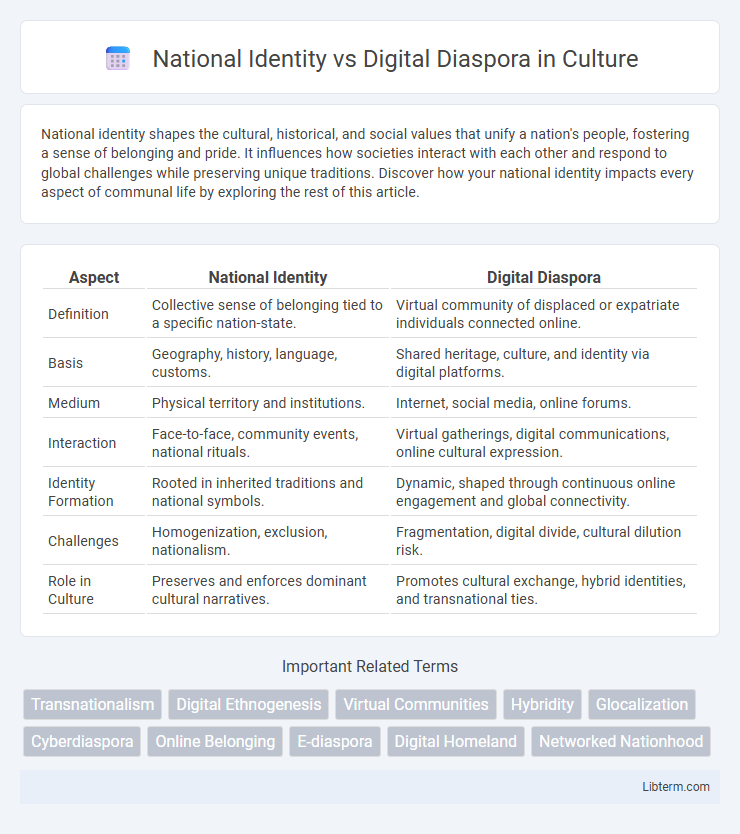National identity shapes the cultural, historical, and social values that unify a nation's people, fostering a sense of belonging and pride. It influences how societies interact with each other and respond to global challenges while preserving unique traditions. Discover how your national identity impacts every aspect of communal life by exploring the rest of this article.
Table of Comparison
| Aspect | National Identity | Digital Diaspora |
|---|---|---|
| Definition | Collective sense of belonging tied to a specific nation-state. | Virtual community of displaced or expatriate individuals connected online. |
| Basis | Geography, history, language, customs. | Shared heritage, culture, and identity via digital platforms. |
| Medium | Physical territory and institutions. | Internet, social media, online forums. |
| Interaction | Face-to-face, community events, national rituals. | Virtual gatherings, digital communications, online cultural expression. |
| Identity Formation | Rooted in inherited traditions and national symbols. | Dynamic, shaped through continuous online engagement and global connectivity. |
| Challenges | Homogenization, exclusion, nationalism. | Fragmentation, digital divide, cultural dilution risk. |
| Role in Culture | Preserves and enforces dominant cultural narratives. | Promotes cultural exchange, hybrid identities, and transnational ties. |
Defining National Identity in a Globalized World
National identity in a globalized world is defined by shared cultural values, historical narratives, and collective memory that distinguish one nation from others despite increasing transnational interactions. Digital diaspora challenges traditional notions by creating virtual communities that maintain cultural ties and national pride beyond physical borders. This evolving dynamic reshapes how individuals perceive belonging, blending local identity with global digital connectivity.
The Rise of the Digital Diaspora
The rise of the digital diaspora is transforming traditional notions of national identity by enabling individuals to maintain cultural connections across borders through virtual communities and social media platforms. Digital diaspora networks facilitate the exchange of language, traditions, and political ideas, creating a fluid sense of belonging detached from geographic constraints. This global connectivity challenges the fixed nature of national identity, promoting hybrid identities shaped by both homeland heritage and digital interaction.
Online Communities and Shifting Cultural Boundaries
Online communities significantly influence the evolution of national identity by transcending physical borders and fostering a digital diaspora where cultural boundaries become fluid and dynamic. These virtual spaces enable individuals to maintain connections to their heritage while simultaneously adopting and blending multiple cultural narratives. The interaction within digital diasporas reshapes traditional notions of identity, highlighting the role of technology in creating hybrid cultural experiences and facilitating global belonging.
Technology’s Role in Preserving Heritage
Technology plays a crucial role in preserving national identity by digitally archiving cultural artifacts, traditional knowledge, and historical narratives, ensuring their accessibility across global digital diasporas. Virtual museums, interactive platforms, and language preservation apps help maintain heritage connection among dispersed populations despite geographical separation. These tools foster a dynamic exchange between homeland roots and diasporic identities, bridging generational gaps and reinforcing cultural continuity through innovative digital means.
Conflicts and Synergies: Nationalism Meets Digital Belonging
National identity often emphasizes territorial belonging and shared cultural heritage, while digital diaspora fosters transnational connections and fluid identities beyond borders. Conflicts arise when nationalist movements perceive digital communities as threats to sovereignty or cultural purity. Synergies emerge as digital platforms allow diasporic populations to reinforce national pride and mobilize support for homeland causes, blending traditional nationalism with global digital belonging.
Social Media: A Double-Edged Sword for Identity
Social media platforms act as a double-edged sword for national identity and digital diaspora by simultaneously strengthening cultural ties and enabling the fragmentation of collective identity. While they facilitate connection and cultural expression among dispersed communities, these platforms also expose users to diverse influences that can dilute traditional national narratives. The interplay on social media shapes evolving identities by blending local heritage with global digital interactions.
Digital Diaspora’s Influence on Political Engagement
Digital diaspora communities significantly enhance political engagement by leveraging online platforms to connect dispersed individuals with shared national identities, fostering transnational activism and advocacy. Through social media networks and digital forums, these communities mobilize resources, coordinate campaigns, and influence political discourse both in host countries and countries of origin. This digital connectivity transforms traditional notions of national identity by enabling sustained participation in homeland politics regardless of geographic location.
Language, Tradition, and Adaptation Online
National identity is deeply rooted in language preservation, traditional customs, and shared cultural narratives that define a community's heritage. Digital diaspora communities adapt these elements by integrating native languages and rituals into online platforms, creating hybrid spaces that sustain identity across borders. This adaptation facilitates cultural continuity while reshaping traditions through digital communication, social media, and virtual networking.
Virtual Networks: Challenging Traditional Notions of Belonging
Virtual networks redefine national identity by enabling digital diasporas to maintain cultural ties beyond geographic borders, fostering transnational communities united by shared heritage rather than physical location. These online platforms challenge traditional notions of belonging by creating fluid identities that integrate multiple cultural influences and allow individuals to participate in national discourses virtually. The rise of digital diasporas within virtual networks highlights the evolving interplay between technology and identity, emphasizing connectivity over territorial boundaries.
Future Trends for National Identity in the Digital Age
Future trends in national identity within the digital age emphasize the dynamic interplay between traditional cultural heritage and emerging digital communities. Advances in blockchain technology and decentralized digital identities enable individuals to establish secure, verifiable online personas that transcend geographic boundaries while preserving links to their national roots. Governments and policymakers increasingly adopt digital platforms and AI-driven cultural analytics to reinforce national narratives and promote social cohesion amidst the growing influence of global digital diasporas.
National Identity Infographic

 libterm.com
libterm.com